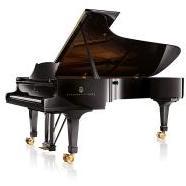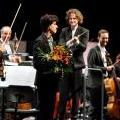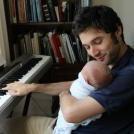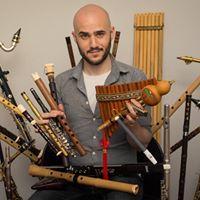Search the Community
Showing results for tags 'orchestration'.
-
Hey folks, This is my latest composition, Ruth. It will be performed by my church's orchestra sometime in the Spring or Summer. I am looking for feedback on this so hit me with anything you've got! I know each section is pretty short, but it's what I had to do in order to fit the type of concert it will be performed at. Thanks! https://www.youtube.com/watch?v=-c3YJdnU_Lg
-
Hello all I am looking to improve my orchestration. So, I looked around the Internet and found Berlioz's Treatise on Instrumentation on IMSLP. However, as useful as this has been, it is not exactly what I am looking for. What I try to find is not a book which tells me about about the instruments themselves, but rather how to combine them and make my orchestral scores look and sound good. Glancing at one of my orchestral scores, I can see that the orchestration is very basic, and probably sounds as much. (It is on manuscript, so I cannot hear it) Does anyone know of any books/websites/articles that will help me to improve this aspect of my orchestration? Thanks
-
Hey guys, sorry for not posting recently. I've just moved to start going to school for organ performance, but I've been getting back into composing over the past weeks. Here's a project I've started and finished during that time.
- 2 replies
-
- orchestration
- movement
- (and 4 more)
-
Hello composers! This will be the place where I will share one classical composition including saxophones per week. The videos are not mine! As a saxophonist, I notice that still many composers do not use the saxophone in classical music. The most important reason for this is because they do not know how to apply the instrument. I often get the question if I could give some study advices for saxophone writing. My answer is always that one has to listen and study the works of our predecessors. This topic is meant to inspire and stimulate composers to write more music for the saxophones. Contents Graham Lynch - Unreal Promenade for Saxophone Ensemble (2015). Jean Françaix - Cinq Danses Exotiques for Alto Saxophone and Piano (1961). Georges Bizet - Suite No.1 from the drama l'Arlésienne (1872). Claude Debussy - Rhapsodie for Saxophone and Orchestra (1901 - 1911). Slava Kazykin - ''Bachiazzola'' for Saxophone Quartet (n.d.). Mark Watters - Rhapsody for Baritone Saxophone and Wind Orchestra (2001). Iannis Xenakis - XAS (1987). Mozart / Arr. Niels Bijl - String Quartet No.15 in D minor, Kv. 421a. Paul Creston - Sonata for Alto Saxophone and Piano, Op.19 (1939). Erwin Schulhoff - Hot Sonata (1930). Carter Pann - The Mechanics for Saxophone Quartet (2013). #1 Graham Lynch - Unreal Promenade for Saxophone Ensemble (2015). More information in the description of the video. Best wishes, Maarten Bauer
- 38 replies
-
- masterclass
- bauer
-
(and 5 more)
Tagged with:
-
I’m writing some music for my friends. More on that in a bit. These little nuggets will one day become my first symphony. I guess wouldn’t exactly call them sketches since the music is written beginning to end, but they feel rough because they are not yet fully orchestrated. Either way, once that final orchestration phase is complete, this work will be a substantial piece of music, with a lot of rich content for the listener to explore. For now I’ve chosen a basic instrumentation of flute, oboe, trumpet, low strings. This can give a feel of being fleshed out, but is small enough to make sketching manageable, and colorful enough to make it fun. This instrumentation also helped me get away from the violin-centric symphony model, since I haven’t included violins in my original sketches. When I sit down and orchestrate this thing for real I will add violins in at my leisure, like a painter who, with one smooth movement, adds a bit of reflected light to a child’s eye. The next step is to dive deep into the orchestration and make some hard choices. But for now, I’m savoring the completion of an crucial leg of this artistic journey. This particular piece has taken years to get to this spot, and where it will eventually lead I am not entirely sure. Sometimes it’s just important to pause and recognize a milestone. The working title is “Homies”: Joe Soeller Evan Adventure Cat Erica Hunt-Shaw I’m not totally settled on all aspects of this music, but the overall arc I love. This is music for my friends. It’s a celebration of what we’ve all accomplished together, what we’ve built, the life we’ve lived, the love we’ve felt. The music goes a lot of different places, as do long friendships. For us the highs have been high, and there really haven’t been too many lows, and even if a low came along, we all know the high was coming back soon enough. Some of this music is an intense philosophical probing, difficult questions asked, journeys of personal growth, a connectivity that grows deep like tree roots, music for my brother. Another part is a long and exotic road trip adventure. Fences climbed, open mics pioneered, tequila bottles also pioneered. This is music to play spinbat to. And yet another section is a song of love, a private song, a hidden cave. When I dive back into this music and turn these nuggets into completed symphony movements, I may end up expanding certain chunks, or slowing down the tempo for a section, or taking the music in a slightly different direction if the mood strikes me. I’m still shaping the clay a bit. But the meaning behind the music will not change. It’s that meaning that underscores every note of this music, every rise and fall. It’s that meaning that drives me to complete it. I welcome any feedback.
-
- sketching
- orchestration
-
(and 1 more)
Tagged with:
-
Another little something for critique (please rip it to shreds!) I'm not particularly happy with this at the moment. Feels like it's all over the place. I think my main issue is probably the strings — they just don't feel like they're working. It's probably a combination of the writing and the orchestration (and maybe the samples I'm using as well), but maybe some more seasoned composers can give me some tips here (especially at mark D...) As an aside, the director loves it, and is going to use it, but just for my own purposes I want to see if there's anything I can do with this to polish it up a bit. Score is attached, if that's helpful. Anyway, here it is in context (ungraded first cut):
- 2 replies
-
- film
- soundtrack
-
(and 1 more)
Tagged with:
-
Hello everybody, On FaceBook I have seen an invitation to write for the carillon of the Domtoren (church) in Utrecht. I never came on the idea to write for this instrument until now. The problem is that I don't know how to compose for the carillon. I cannot find much information about the possibilities and limitations of the carillon, so I would really appreciate it if you could tell me more about it! Thank you, Maarten
- 2 replies
-
- carillon
- instrumentation
-
(and 4 more)
Tagged with:
-
Arrangement of Crown Him With Many Crowns
celloman99 posted a topic in Orchestral and Large Ensemble
Here's an arrangement of Crown Him With Many Crowns. I'm pretty new to orchestration, this is the first project with this many instruments that I've actually finished. So I'm very happy to hear any tips, suggestions, corrections. I'm definitely not finished with this so please feel free to comment anything you feel would make it better. Thanks! P.S. Sorry again for MIDI instead of MP3 Crown Him With Many Crowns -Rough Draft MIDI.mid- 2 replies
-
- hymn
- orchetstra
-
(and 2 more)
Tagged with:
-
Hey fellow composer, I'd like to introduce myself; I'm Frederic Bernard a composer and orchestrator from Germany. I've just launched my homepage and finnished the writing on my very first orchestration tutorial. It's all about how to properly apply legato on all the different instruments. It can be downloaded here. ...listening samples (including some of my own live orchestra scores) are of course included, happy reading! :) cheers, Frederic
-
- legato
- orchestral
-
(and 3 more)
Tagged with:
-
First thing you'll note about this... this is NOT the 8-bit-Evolution challenge. We figured we'd let that one settle for a while. Instead, this will be a general video game orchestration competition for a game that already exists: Chrono Trigger. We thought it'd be good to branch out with our competitions a little bit and are excited to see the results of this! Here is the link to the intro cutscene entrants will be scoring for: https://www.youtube.com/watch?v=hOmgIZZuI68 Purpose and Expectations: 1. Write a score that accompanies the visuals in this intro. It should try to invoke the same sort of adventurous feeling as the original score. /10 2. Synching is not easy. I'll accept some issues with synching, but in general the music should match the scene. /10 3. Does it sound like this could be played in real life? In other words, does the orchestration seem feasible? /10 4. All entries will be played for a person who has not played the game before and also has little formal music education. Did you get them excited to play the game? /10 TOTAL: /40 Note: Sound effects in the original cutscene will not be taken into account. Entrants will signal their intent to enter by responding to the comment thread on this topic. Provided this gains enough attention, I'll open another topic for entrants to post their entries. Entrant: 1. SallyTheSeabird 2. LostSamurai 3. Between Skies 4. fishfry 5. Mark Paul Entrants can now sign up whenever they'd like before the due date. Due Date for Final Entry: TENTATIVE (12/20) Good luck!
- 32 replies
-
- 1
-

-
- trailers
- orchestration
-
(and 1 more)
Tagged with:
-
I thought you guys might be interested in my new series! I'm creating 2-3 minute videos about writing for every member of the woodwind family. I also am more than happy to answer any questions that are posted on the video. If you're interested, here's the playlist:
-
I've recently been researching the harp and have learned things such as the pedaling system, register colors, and idiomatic playing. I've also been exposed to a technique called "pres de la table" which basically means to pluck the strings close to the soundboard. The effect is a darker, edgier sound. I was hoping if a knowledgeable composer or harpist could answer my questions: Is pres de la table an extended technique that should be used sparingly, or is it a color choice that is up to the composer? Also, are there any other "extended techniques" on the harp that I should know about?
- 1 reply
-
- harp
- orchestration
-
(and 2 more)
Tagged with:
-
Unfortunetely, service is not available now. Symphonic Music.mp3
-
- composition
- orchestration
-
(and 2 more)
Tagged with:
-
Need a hand with a score, a part or an arrangement? As a professional orchestrator/arranger I'm happy to launch a special service called Micro Orchestration. Micro Orchestration is a special service for the small tasks in music preparation. Whether for the busy composer needing a transcription of an arrangement or part preparation for a recording or a composer who only needs orchestration of one cue or a producer wanting horn arrangement for a song: Micro Orchestration is a special service for the tasks that are estimated to be done in 3 hours or less. Not only do you get a 33% discount on services like proof reading, part preparation, layout, transcription or orchestration, you also pay by the minute. If the task takes 72 minutes, you are not billed for 2 hours In addition as a special launch promotion for the rest of 2014; the first half hour is free. If the task takes 72 minutes, you are only billed for 42 minutes! If the task exceeds 3 hours you will not pay for the exceeded time. Small tasks – small prices Micro Orchestration can include – but is not limited to: Transcription Proof reading Arranging strings or brass Orchestration Part preparation For pricings and how to book: MICRO ORCHESTRATION
-
I do it out of necessity, but it is horrible. And embarrassing, considering my father was/is a horn player. Anyway, I write mostly for natural horn as I prefer its sound to that of modern horns. I also score for the horn as though I am an 18th century composer. If the work is in A Major, than the Horns are in A. If the key is E-flat Major, the horns are in E-flat. If G, than they are in G, and so on and so forth. (As though they use crooks.) However, there are a plethora of issues that arise: What notes specifically can it play- what is the harmonic series? That is, what pitches and/or scale degrees are actually playable on the horn of Mozart's and Beethoven's day? Also, what is the range- how low can it go. I've seen bass clef notation in Beethoven (the first bars of the 7th symphony for example) and Wagner (to my knowledge he wrote for natural horns- most scores of his operas give horns more keys other than "F") This is driving me insane and has really sapped my desire to write lately as I'm not entirely sure I like what I have for horns in some of my works. I suppose I could scrap it and just boot the horns out of my works (which I'm not OK with, but I'm even less OK with not writing for a few days). I want to go into filling in their parts with clear knowledge of what they can and cannot do. Disclaimer: I REFUSE to write for valved horns unless the work itself requires it in my estimation. But I will always prefer the sound of the natural horn, particularly in works where the winds and strings carry the majority of the work. What can I say, I am not a huge fan of the brass section.
-
Hello all, this is the first time I'm attempting a challenge, so if I'm doing something wrong or not allowed, just let me know, I rarely go here :( So, I'm giving composition lessons to a friend of mine, who is a fantastic pianist, and in an effort to try to get him off the piano, and to teach him orchestration, I challenged him to write a wind quintet, by hand, and he must start full score. So, I'm gonna give you this same challenge. Rules: -write a short piece for Wind Quintet (under 4 minutes, for Flute, Oboe, Clarinet, Bassoon and Horn, no doubling to alto flute or anything like that) -you cannot just write for piano then expand it to wind quintet, you must start with full score Points: Orchestration (40 points): How well did you use each of the instruments? How successful were you in using the instruments to create the voice of the piece? Play-ability (35 points): Is it playable? If this were to be sight-read by an actual quintet, how successful would it be? Basically, the easier the better, you want many people to be able to perform this Presentation (10 points): This is too often overlooked, if they can't read it, they can't play it Musicality (15 points): How successful were you in using Melody, Harmony, Rhythm, Form, Dynamics, etc. to create a coherent, interesting, and unique piece? I will give you all the same amount of time I gave my student, around 2 weeks. Remember, it's supposed to be short. If no one can turn it in by the deadline, I'll extend it, but just know that my student, who started composing just this year and is writing his FIRST piece without piano can do it, so don't lose faith! Deadline: June 1 This challenge is aimed towards composers who started off on piano and feels that they are too dependent on their piano skills. This is for those who wish to improve their orchestration skills and to compose from the viewpoint of a composer, rather than a pianist (if that makes sense). I would be fine with judging this piece, but if anyone else wants to, that would be perfect! (Austenite? Sojar Voglar?) Good luck! I hope this challenge will be an excellent opportunity to improve your orchestration skills, as much as it is to improve my teaching skills, I am going to college for music education along with composition so this is a good exercise for me too :) Finally, we get to the most important part, the prize :D I am an All-State level Oboist, and I am now a member of the Oboe studio at Lawrence Conservatory (starting next year, woot!) I will commission the winner to write a piece for solo oboe (and maybe w/ piano accompaniment, although that's kinda against the point of this competition XD) and I will record it to the best quality I can get. I am looking into opportunities to perform over the summer at recitals or competitions, if I find one, I will include your piece in it, basically, I will try my darnest to perform your piece in front of a live audience. ok, I think that's everything, ready, set.... COMPOSE!
-
Really need a moving piece for my leavers assembly. I have lyrics, anyone write music? Please help! Will make it worth your while :) Email 07rebeccalancashire@longdean.herts.sch.uk
- 6 replies
-
- composition
- orchestration
-
(and 1 more)
Tagged with:
-

The Orchestra And Its Reluctant Use Of Brass
gigeorge17371 posted a topic in Composers' Headquarters
It seems to me that brass in the orchestra is reluctantly used, held back for the big explosion, almost like percussion. Particularly in the romantic era/ nineteenth century (whatever you want to call it). I understand as time has progressed that brass has had its wondrous moments of melodic bliss but they are quite few and far between. Mahlers Funeral March in his 5th symphony is a good example. I'm hoping you guys can prove me wrong by presenting a work (or part of) from any era, could even be one of your own works, that displays a good use of the Brass ensemble. It would be grand if you could explain why as well. I'd probably put this forward as the finest use of the Brass ensemble in a Romantic orchestra- Verdi's Triumphal March from Aida I think this particular march possess' fantastic orchestration for Brass. When the main theme of the march is presented on solo trumpet and is likely accompanied by lower brass you question where Verdi is going to this... he doesn't explode into an array of noise. Instead theres a brief explosion in the orchestra before the theme is repeated. This time by two trumpets. < so subtle but beautifully effected, it portrays the unity that a march should possess. The theme is repeated a third time but the trumpets separate, one possessing the theme and the other the counter-melody. The strings and wind then take over for a brief interlude before the brass re-enter playing what I believe is an earlier theme. Then whats this the trumpets return in a grandioso finish accompanied by the full orchestra. I just think its incredibly effective orchestration and Verdi doesn't lose the effect of the brass when they return at the end. Instead it is probably heightened as we are just waiting for them to return! Anyway... It would be cool to see what any of you find. -
Right, welcome to the orchestration lessons thread! First lesson on Haydn is attached. Orchestration lessons 1.pdf
- 8 replies
-
- orchestration
- Haydn
-
(and 3 more)
Tagged with:









